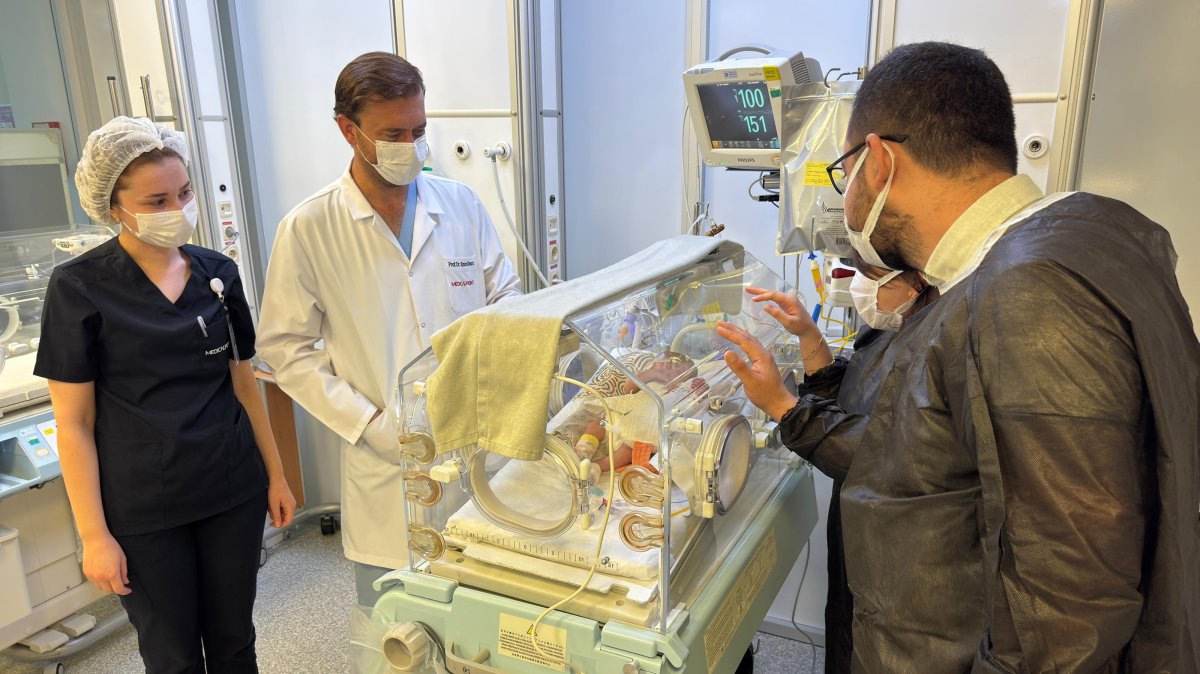At just 34 weeks, little Deniz Kaan came into the world fighting the most brutal battle imaginable. Born with a rare condition called an omphalocele, where his intestines and liver were outside his tiny body, doctors warned his chances were slim. Some even told his parents to end the pregnancy.
The story begins where Serkan Kurnaz and his wife Bilge Kaplan Kurnaz learned at the 11th week of pregnancy that their baby had an omphalocele, a rare condition where the baby’s abdominal organs develop outside the body.
Following the diagnosis, some doctors advised the couple to terminate the pregnancy, saying the chances of survival were low. But the couple, determined to fight for their child, refused to give up.
Through a recommendation from a relative, the family contacted associate professor Halil Gürsoy Pala, an obstetrician and gynecologist at Bazekol Çiğli Hospital in Izmir, western Türkiye.
From that point on, Deniz Kaan’s development was closely monitored by Dr. Pala and professor Emre Divarcı, a pediatric surgeon from Medical Point Hospital.
After birth, Deniz Kaan underwent two successful surgeries performed by professor Divarcı to return his organs to the abdominal cavity.
Now nearly a month old, his family is counting down the days until they can finally take him home.
Father Serkan Kurnaz said that the diagnosis came as a shock during routine checkups, saying, “Our first doctor told us to stop the medication and consider ending the pregnancy. But my wife and I sat down and decided that we would fight for our baby. We became parents after 10 years of marriage.”
“There was no way we’d give up. We chose to continue the medication, to fight, and now we’re almost there. Deniz Kaan is still in intensive care, but he’s improving every day. We want our story to give hope to other families going through similar struggles,” he continued.
Mother Bilge Kaplan Kurnaz tearfully recalled the emotional rollercoaster of the pregnancy. She said her world came crashing down when doctors first recommended termination, “It’s a long road, but one that requires patience. With love, with patience, and in safe hands, we’re getting closer to hope. Closer to our child. I’m glad we didn’t give up.”
Every time I see him in the incubator, I’m overwhelmed with emotion. All I want is to hold him, to touch him. It’s been 31 days, and I haven’t been able to. We’re keeping a diary for him so he’ll know every step of this journey,” she said.
“This is his story. The story of a miracle. The hopeful journey of a strong baby. Babies are strong, never give up on them. As long as you stand strong, no path is impossible. Just keep searching,” she said.
Pala emphasized that an omphalocele can be detected early through ultrasound scans. If no other genetic issues are found, the condition can often be successfully treated after birth.
“After identifying the issue during pregnancy, we conducted detailed testing and carefully monitored the pregnancy. When the time came, we transferred the baby to the surgical center without causing any damage to the omphalocele sac,” said Pala.
Professor Divarcı, who performed the surgeries, explained that the baby had a 10-centimeter abdominal wall defect at birth. He weighed 2,100 grams (4.63 pounds) and underwent what’s known as a “staged repair.”
“We first placed a mesh to close the opening gradually. Then we performed a second surgery to close it completely. Now the abdominal wall is fully closed and we’ve started feeding him. We plan to discharge him in the next few days,” he said.

The Daily Sabah Newsletter
Keep up to date with what’s happening in Turkey,
it’s region and the world.
SIGN ME UP
You can unsubscribe at any time. By signing up you are agreeing to our Terms of Use and Privacy Policy.
This site is protected by reCAPTCHA and the Google Privacy Policy and Terms of Service apply.

